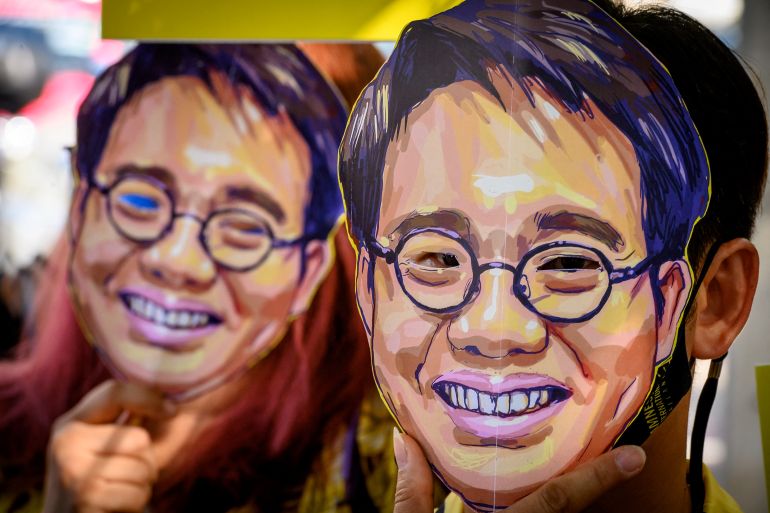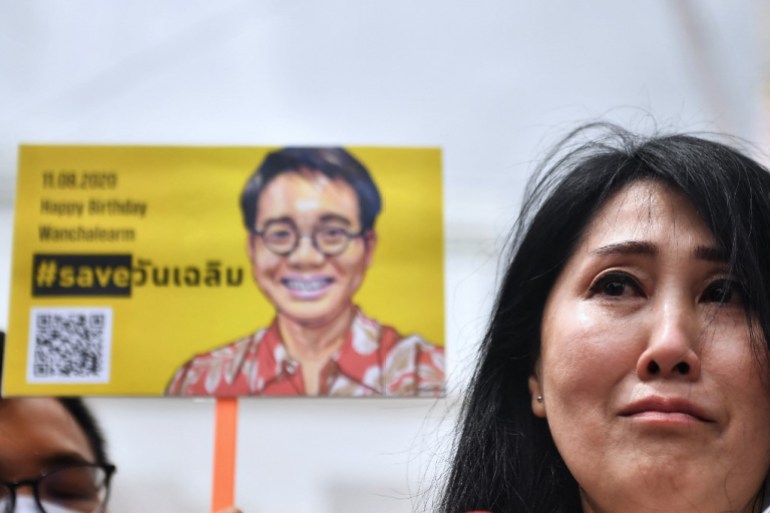No justice: A year on, Thai dissident still missing in Cambodia
Wanchalearm Satsaksit, a critic of the Thai prime minister and the military coup he led, was abducted on broad daylight in Phnom Penh in June 2020.

One year since a prominent Thai dissident went missing in Phnom Penh, the Cambodian government is still failing in its obligation to investigate his “enforced disappearance”, Amnesty International has said as it called on Thailand and the Association of Southeast Asian Nations (ASEAN) to conduct an independent inquiry into the case.
Wanchalearm Satsaksit, a critic of Thai Prime Minister Prayuth Chan-ocha and the military coup he led in 2014, was dragged into a car in broad daylight on the streets of the Cambodian capital on June 4 last year and nothing has been heard of him since.
Keep reading
list of 3 itemsThai prosecutor indicts 18 over anti-government protests
Jailed, in hiding, expelled: Cambodia’s Mother Nature crackdown
“This negligent investigation is at a standstill. The past year has been marked by foot-dragging, finger-pointing and the absence of any credible effort to examine what really happened to Wanchalearm,” Ming Yu Hah, Amnesty International’s Deputy Regional Director for Campaigns, said in a statement on Friday.
“The persistent failure of the Cambodian authorities to properly investigate Wanchalearm’s enforced disappearance is in clear violation of Cambodia’s international human rights obligations.”
At the same time, Amnesty also raised concerns about Thailand’s seeming determination to go after political activists and critics already living in exile.
The rights watchdog group said Wanchalearm’s disappearance corresponded to “a deeply alarming pattern of abductions and killings” since June 2016 of at least nine Thai activists living beyond its borders in neighbouring countries such as Laos and Vietnam.
Human Rights Watch (HRW) also condemned the abduction and the delay in the investigation, saying both the Cambodian and Thai government’s “failure to locate Wanchalearm is glaring.”
“The authorities in both countries appear to be deliberately slow-walking their investigation despite the abduction occurring in broad daylight before multiple witnesses. This charade raises concerns about their own role in Wanchalearm’s disappearance,” Brad Adams, Asia director of HRW, said in a statement on Friday.
Cambodian and Thai authorities have said they are investigating the case.
Caught on video
Security-camera footage published in the media following the 2020 abduction of the then 37-year-old Wanchalearm shows a blue Toyota Highlander leaving the scene outside his Phnom Penh apartment, where he was last seen.
The footage also shows two men who appear to have witnessed the abduction.
Wanchalearm’s sister, Sitanun, was quoted as telling the media that she was talking on the phone with him and heard him scream: “I can’t breathe” repeatedly before the call was cut off.
Witnesses also told journalists that as the assailants attacked Wanchalearm, he repeatedly screamed: “Please help!” in Khmer.
Before the incident, there were reports that unidentified men with crewcut hairstyles had been shadowing the self-exiled activist, who is affiliated with the United Front for Democracy Against Dictatorship, known as the “Red Shirts”.
This month marks a year since Thai government critic Wanchalearm “Tar” Satsaksit disappeared following his apparent abduction in Cambodia on June 4, 2020, family in anguish but authorities silent.https://t.co/EoeCxURqv6 pic.twitter.com/FWJM6totZm
— Thai PBS World (@ThaiPBSWorld) June 2, 2021
Wanchalearm fled Thailand in 2014 shortly after the coup that installed Prayuth as the country’s military leader. Prayuth was later elected prime minister in a long-delayed election that critics said was manipulated.
Thorn in Prayuth’s side
Even in self-exile, Wanchalearm remained politically active, frequently using social media to criticise Thai authorities. A day before he disappeared, Wanchalearm had posted a video clip on Facebook criticising the prime minister.
Thai authorities had filed criminal charges against him prior to his disappearance.
In 2018, they brought charges against the activist under the Computer Crime Act, alleging that he had posted anti-government material on a satirical Facebook page.
At the time, Thai authorities also reportedly requested Wanchalearm’s extradition from Cambodia although Phnom Penh has not publicly acknowledged receiving any such request.
Wanchalearm was also among a large number of activists and political figures who were issued summons following the coup in May 2014, and Thai authorities filed charges against him for failing to report to police.
A criminal investigation into the disappearance of Wanchalearm has been formally under way in Cambodia since September 2020 but there has been little progress on the case.
Amnesty says it is “deeply concerned” that the Cambodian authorities have “failed in their obligation” to conduct “a prompt, thorough, impartial and independent investigation” into the case.
Sitanun gave evidence to a court in Phnom Penh in December 2020 about her brother’s disappearance but the authorities have not reported any new investigatory actions since.
“The inadequate response by the Cambodian authorities and the lack of due diligence to react to the new evidence provided by Wanchalearm’s sister reinforce fundamental concerns regarding the credibility of the investigation,” Amnesty said.

Cambodian police told the AFP news agency they were investigating but also cast doubt that Wanchalearm was abducted.
“We don’t have any new information so far. We are trying our best to collect any clues to confirm whether or not such a case happened in Cambodia,” said Chhay Kim Khoeun, the Cambodian National Police spokesman.
Thai authorities say they are investigating as well, but that it is up to Cambodia to lead the investigation.
In light of the “clear failures” of the Cambodian investigation, Amnesty has urged Thailand’s attorney general “to immediately launch” a formal probe in coordination with the country’s human rights commission “in order to further safeguard the independence and credibility” of the process.
Amnesty also reiterated its calls on the ASEAN Intergovernmental Commission on Human Rights (AICHR) to step in, not only in Wanchalearm’s case but other Thai exiles who have been killed or abducted in recent years.
ASEAN, a regional grouping of 10 countries, has a policy of non-interference.
“ASEAN and AICHR’s silence in the face of cross-border enforced disappearances in the region is shameful,” Amnesty said. “This is regional cooperation at its absolute worst. Rampant impunity, injustice and human rights violations are facilitated by the regional body’s inaction.”
Amnesty has previously expressed concern for the safety of Thai exiles in neighbouring countries whose extradition has been sought by the Thai authorities.
In each case, Amnesty said that Thai authorities had sought the individuals’ arrest or extradition in relation to criminal charges filed in connection with their exercise of the right to freedom of expression, often online and in some cases while in exile.
A group of Cambodian and Thai human rights organisations also issued a separate statement on Friday calling on authorities on both countries to “identify those responsible in order to bring them to justice”, and ensure Wanchalearm family’s right to obtain reparation.
The statement was signed by the International Federation for Human Rights, the
Cambodia Human Rights and Development Association, Thai Lawyers for Human Rights and several other rights groups.